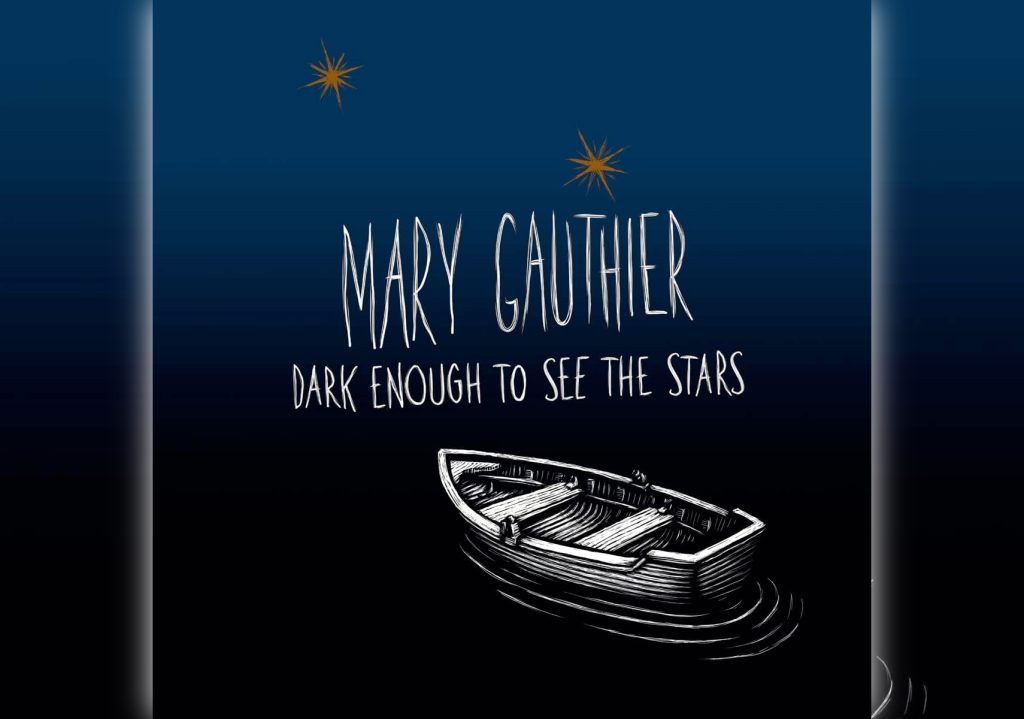Album Review: “Dark Enough to See the Stars,” Mary Gauthier
By Sam Seliger

The singer-songwriter tradition is often known for its sad songs. Great songwriters are supposed to be able to crank out a tearjerker not just for the sake of writing a successful song but to actually express inner pain that others can relate to.
Mary Gauthier can certainly write a sad song. Over her quarter-century career, she has penned countless tunes that cross the whole span of sad and difficult emotions. Yet Gauthier’s newest album Dark Enough to See the Stars, her first of all originals since 2014 (and only her second in a decade), has more than just sad songs, even by the broadest of definitions. She described it as a “happy sad” record, a term that could be applied to nearly every track.
The opener, “Fall Apart World,” certainly seems from the title like it’s going to be a downer, but it’s actually a song of hope. With an upbeat mid-tempo bounce driven by acoustic guitar and organ, it’s a love song about hope and salvation in spite of struggle and trauma. Gauthier’s voice has aged and weathered through the years, getting huskier and deeper (it sounds almost androgynous at times); this lived-in character adds a dimension to the testaments of struggle, particularly when it is joined by the more youthful voice of her partner, Jaimee Harris.
This resilience-through-love theme runs throughout the album, coloring all of the happier songs and adding a sense of worldliness that, in a way, sweetens their joyful payoff. The gospel-tinged “Thank God for You” is the opposite of a saccharine love song, with the verses focusing almost entirely on the struggles that came before salvation. Without them, the refrain would likely fall flat as just a two-dimensional statement of affection; instead, it becomes an affirmation and a way forward.
One of the album’s most striking turns is the pivot leading into “How Could You Be Gone,” the most somber of the whole set. All of the tracks keep a relatively calm tempo, though none drag, but the mood shift is immediate. In the past two years, Gauthier has lost a number of close friends and peers, including longtime friend David Olney and mentor Ralph Murphy, and one cannot help but hear the song as speaking to such losses. She focuses on the smallest of details–not knowing how to dress for the funeral, the movement of cars arriving in the parking lot–that keep the song’s emotions in perspective. This close-up approach is devastatingly effective: Gauthier conveys the confusion and aimlessness of dealing with loss instead of trying to make a grand dramatic portrayal. Particularly in the third verse, as the narrator leaves the funeral mid-service, the rawness and immediacy of the song’s emotions come through the coldness.
The middle part of the album is particularly heavy, but it never gets despondent or hopeless, and the title track speaks to this resilience the best. Inspired by a quote from Martin Luther King Jr, the song weaves figurative and literal language to speak to the power of love and faith to keep a person going. The “happy sad” approach is never clearer, as Gauthier highlights the way that struggle and pain can give people the opportunity to better appreciate their world.
Dark Enough to See the Stars is not about being both happy and sad, or sometimes one and sometimes the other, or about songs that highlight one specific emotion. Instead, it focuses on the way that experiences and emotions come together to form a person’s life. Gauthier’s tremendous skill as a songwriter enables her to bring out this nuance every step of the way, not so that she can show off her craft, but so that we can see the stars too.
Mary Gauthier’s album Dark Enough to See the Stars is available now across all streaming services. Hard copes are available here.
Sam Seliger is a student at Columbia University and the Head of American Music at WKCR-FM NY 89.9.
One thought on “Album Review: “Dark Enough to See the Stars,” Mary Gauthier”
Comments are closed.